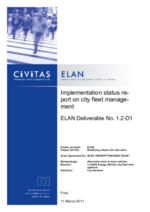Upgrading the city car fleet
Thematic areas
Clean & energy-efficient vehicles
Summary
In Gent will look for cleaner and more efficient vehicles and enhance the introduction of cleaner/alternative fuels
Implementing sustainable mobility
The objectives are:
A reduction in the use of fossil fuels in the City fleet
City of Ghent wants to explore the feasibility of the use of biodiesel (30% mix with standard diesel) and wants to replace existing cars by environmentally friendlier cars to promote a sustainable car fleet. By reducing the use of fossil fuels, the City of Ghent sets an example for the city employees and citizens to become less dependent on fossil fuels.
Efficient use of the city fleet
A City fleet management cell has been installed to increase the efficiency of the city fleet. By providing the car fleet at important and central locations and by providing a reservation tool to organise the mutual use of the pool cars, the city fleet will be used more efficiently. We hereby focus on standard vehicles, more precisely passenger cars.
We will introduce clean fleet vehicles and sustainable fleet management for city administration in support of local air quality objectives within each of the CIVITAS-ELAN cities.
Eco driving: Reduction in fuel consumption through driver training
Eco driving lessons will teach a group of 59 city employees the basic principles of eco driving in order to obtain a more efficient and environmentally friendlier driver style.
Progress
This measure consisted of improving the private fleet management for the employees of the City of Gent. The main goal was to reduce the emissions of the vehicle fleet by increasing the efficiency of the fleet and reducing the use of fossil fuels in the City fleet. The number of vehicles was reduced, cleaner vehicles were introduced (e.g. 14 electric cars & 1 hybrid truck) and carsharing was promoted. Also 54 employees had the chance to reduce their fuel consumption through an ecodriving training.
The measure had the following deviations:
- Biodiesel – The implementation of B30 was planned but due to several barriers it was cancelled. This part was removed after the 4th amendment.
- City fleet management tool – This part of the measure was removed but will be developed anyway. The tool is planned to be implemented in 2013.
- Electric vehicles – As a result of the feasibility study, 1 hybrid pick-up, 7 full electric vans (Renault Kangoo) and 7 electric cars (Peugeot ion and Volvo) for passenger transport were implemented in the city fleet. This decreased the city fleet’s emissions further.
- Introduction of the Cambio carsharing system in city fleet – The cambio carsharing system has been introduced into the city fleet. The cambio cars were being used by our employees and by citizens in the neighbourhood. Later on in the project: also an introduction of an electric shared cambio car.
Outcomes
It is advisable that a city has a permanent city fleet manager to monitor the cleanliness of the city fleet and to manage the purchases of the fleet. Gent dropped the implementation of biodiesel for several reasons, therefore it is advisable that city does a feasability study before thinking of introducing biodiesel. As Gent introduced ecodriving, we saw that a lot cars had insufficient tyre pressure. This leads to higher fuel use and faster deterioration of the tyres.
- The short term impact of ecodriving is very positive (fuel consumption reduced by 7%), but does not have a long term effect.
Since the city of Gent currently does not have a city fleet management tool and no permanent GPS-tracking devices in the cars, it is impossible to do an accurate follow-up of the cars. The city of Ghent can only keep on spreading the message about energy efficient driving (mailings, stickers in cars, car policy,..) and will continue to stimulate car users to optimize tyre pressure in portable station or at locations provided by fuel suppliers.
- The total fuel use decreased by 24%
The total fuel use of the city fleet decreased by 24%. This is a result of removal of 45 standard cars from the fleet at August 2011 and the replacement of vehicles by a cleaner one following the durable purchase strategy as including the environmental scores as a selection criteria in the tendering procedure.
- Employees started thinking about their transport which leads to a positive effect
By removing 45 cars and 38 light freight from the fleet, employees start thinking about their transport and were "forced" to take a bike. Sometimes this leads to a positive conclusion that in the city centre you can move faster by bike than by car. This even leads to 30% reduction of driven km in the car fleet of the city. Also the total number of km driven of the light freight is reduced by 11%.








